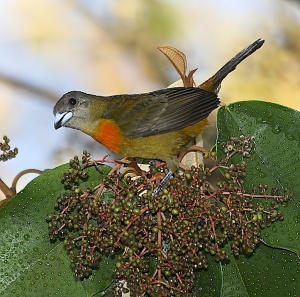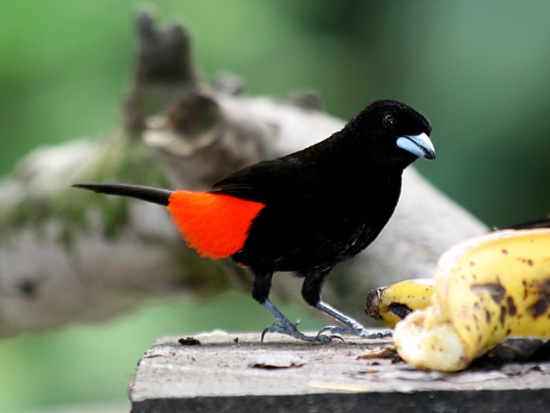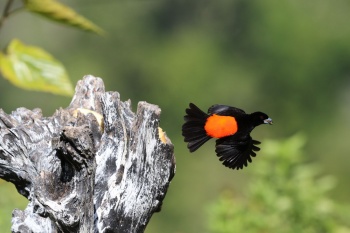Includes Passerini's Tanager and Cherrie's Tanager
- Ramphocelus passerinii
Identification
16 cm (6¼ in)
Male
- Black 0verall plumage
- Scarlet rump
- Silvery bill
- Dark red iris
Female - grey head, olive upperparts becoming brighter and paler on the rump, brownish wings and tail; ochre underparts.

Photo © by Stanley Jones
Si Como No Lodge in Quepos, Puntarenas Province, Costa Rica, March 2007
Variation
Males are virtually identical in the two subspecies but females differ with the females of subspecies costaricensis brighter (orange) on especially rump and breast while females of passerinii are less olive and more yellow especially on underside.
Distribution
Caribbean and Pacific lowlands from southern Mexico to western Panama.
Taxonomy
The Scarlet-rumped Tanager was for a while considered two species but the balance of evidence now concludes it is best treated as one. It seems the strongest evidence for the latest change was how the birds react to song from the other subspecies compared to their own.
Subspecies
There are 2 subspecies[1]:
- R. passerinii passerinii:
- Atlantic slope of Central America, from southern Mexico (southeastern Veracruz and northeastern Oaxaca) to western Panama (Ngäbe-Buglé); also on the Pacific slope in northernmost Costa Rica where the two forms come into contact (formerly Passerini's Tanager)
- R. passerinii costaricensis:
- Pacific slope of southern Costa Rica (Puntarenas) and western Panama (formerly Cherrie's Tanager)
Habitat
Second growth, dense thickets, woodland edges, gardens and pasture with bushes.
Behaviour
Breeding
They construct a cup-shaped nest, which is placed up to 6 m high in a tree. The clutch contains 2 pale blue or grey eggs, with black, brown or lilac markings. There may be a second brood.
Diet
Their diet consists of small fruit, usually swallowed whole, insects and spiders. They forage in pairs, families and groups.
Vocalizations
Both calls and song are described as mostly squeaky and harsh.
References
- Clements, J. F., T. S. Schulenberg, M. J. Iliff, S. M. Billerman, T. A. Fredericks, J. A. Gerbracht, D. Lepage, B. L. Sullivan, and C. L. Wood. 2021. The eBird/Clements checklist of Birds of the World: v2021. Downloaded from https://www.birds.cornell.edu/clementschecklist/download/
- Title, P. O. and K. J. Burns (2020). Scarlet-rumped Tanager (Ramphocelus passerinii), version 1.0. In Birds of the World (S. M. Billerman, B. K. Keeney, P. G. Rodewald, and T. S. Schulenberg, Editors). Cornell Lab of Ornithology, Ithaca, NY, USA. https://doi.org/10.2173/bow.y00599.01
Recommended Citation
- BirdForum Opus contributors. (2024) Scarlet-rumped Tanager. In: BirdForum, the forum for wild birds and birding. Retrieved 1 September 2024 from https://www.birdforum.net/opus/Scarlet-rumped_Tanager
External Links
Search specifically for Cherrie's Tanager:
GSearch checked for 2020 platform.






